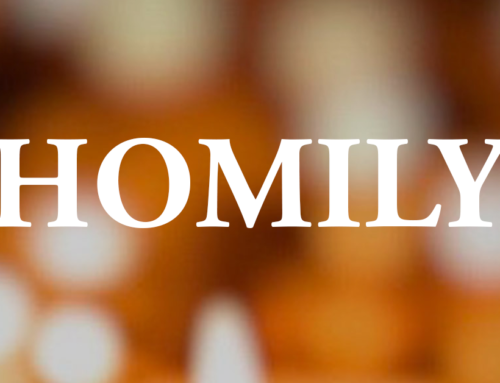Today’s Gospel reading always makes me smile — and yes, I know that’s odd. But this story about John the Baptist raises a fond memory from my childhood. When my brother and sister and I were roughhousing in the living room, our dad would shake his head and say, “You brood of vipers!” As a child, I had no idea that Dad was quoting John the Baptist. And in our family, thankfully, this wasn’t a warning to flee from any wrath that was to come. It was more of a “settle down, kids” moment.
My tender memory is at odds with John’s brutal words. Let’s set John aside for just a moment and look instead at our reading from the prophet Isaiah, which — like my memory — is gentle.
Isaiah’s well-known vision describes a kingdom where the wolf will live with the lamb, the leopard will lie down with the kid, “the calf and the lion and the fatling together.” This vision — often called “The Peaceable Kingdom” — is a vision of God’s kingdom: the kingdom that is simultaneously now and not yet, that is promised to us and that we are called to create on this earth.
It’s a world turned upside down. Not only do wild beasts turn meek; humble creatures are confident to eat beside the mighty. Everything is made new. “And a little child shall lead them.”
God’s dream for us is a kingdom where peace and equity — rather than fear and hatred — hold sway. A place where all are viewed with love and compassion, where God’s mercy shines within and among all people.
Such a kingdom is not possible unless the earth is full “of the knowledge of the Lord as the waters cover the sea.” This place doesn’t just happen. It’s not something we wait for, patiently or otherwise, when we die. Creating the kingdom of God — a place where we love God and our neighbors with all our hearts, all our souls and all our minds — requires intentional effort.
And that’s where John comes in. The voice of one crying out in the wilderness, with a mission too urgent to waste time on dressing and eating well. I’m sure we all know people whose single-mindedness, whose hectoring, drives us a little crazy. But John’s message is one we need to hear and to heed.
John reminds us not to presume that our status is enough. He calls on each of us to “repent”: a difficult, even loaded word for us 21st-century people. Scholars tell us that the Scriptural notion of “repent” goes beyond mere confession and a promise to do better. The Scriptural idea of repentance is deeply shaped by the Jewish experience in the wilderness and in exile. To repent is to return to God — it’s almost a physical turning — to follow a way that leads out of our separation from God and back into connection with our Creator, who loves us beyond our understanding.
I offer that lesson in language because I think this nuance is essential to grasp what John is really saying. His call to “repent” is not simply a harsh judgment on us but, more importantly, an invitation — an invitation to enter into closer relationship with God. To repent is to seek God. To “bear fruit worthy of repentance” is to commit to seeing differently, to thinking differently, to living differently.
John’s invitation is blunt and it is urgent. He shocks us out of our complacency, exhorting us to prune the dead wood of old habits from our lives. This isn’t about judging others and consigning them to eternal fire. This is about self-examination — about pruning the dead wood in our own lives so that fruit worthy of repentance — the new shoot of Jesse — can grow.
Amid this pruning, John offers a message of hope: “The kingdom of heaven has come near.” Jesus is present. God incarnate walks among us and strengthens us to bring about God’s kingdom.
John’s words pour down like fire. But when he acts, he pours out the gentle water of baptism —water that allows the new shoots of life to grow. And all are welcome. Even the vipers aren’t denied a chance to repent — to return to God.
In this busy time of year, we vipers — we children of God — need to hear this reminder of God’s vision for us and for our world. What fruits are we bearing in our lives? What practices can bring us closer to God? How are we called to build God’s kingdom
The time is now. Let us not presume, but return to God. Let us keep our eyes and hearts open, our hands busy at the work that ultimately matters: bringing about God’s Kingdom on earth. Let us prepare the way of the Lord.
Amen.
–Barbara Toman
PDF: Homily for Advent 2 (A)
Written by Barbara Toman
December 4, 2022


